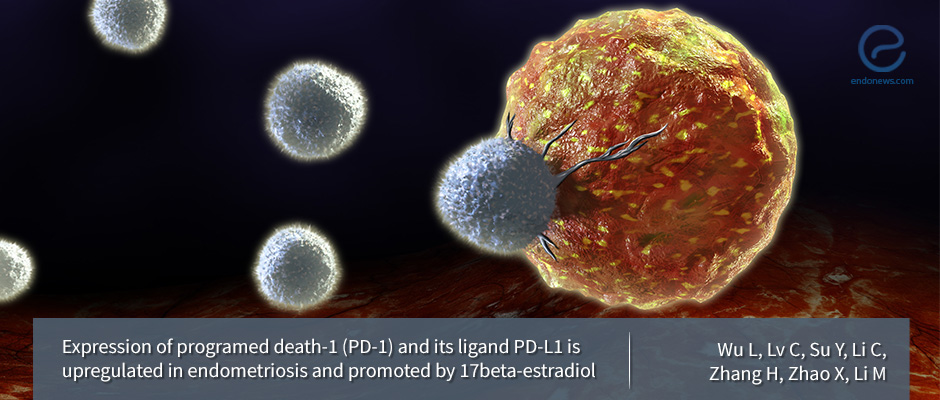Programmed-cell death pathway and immune dysfunction in endometriosis
Dec 7, 2018
Programmed-cell death related molecules are expressed at higher levels in endometriosis and are upregulated by estrogen
Key Points
Highlights:
- PD-1 (programmed death-1) and its ligand PD-L1 are expressed in endometrial tissue and in peripheral blood immune cells of reproductive-aged women and the expression is higher in women with endometriosis.
- PD-L1 is upregulated by estrogen in eutopic endometrial cells.
Objective:
- To explore the expression of PD-1/PD-L1 and the possibility that they are regulated by estrogen in endometriosis.
What's done here:
- Eutopic and ectopic endometria and the blood samples were collected from each of 15 women with and without endometriosis.
- PD-1/PD-L1 expression in endometrial tissues was detected using immunohistochemistry and western blot analysis.
- The expression level alterations were evaluated in endometrial cells after estrogen and cytokine treatment.
Key Results:
- PD-1 and PD-L1 are expressed in endometrial tissue and in peripheral blood T cells of reproductive-aged women and expression levels are higher in endometriosis.
- Treatment with estrogen upregulated PD-L1 in eutopic endometrial cells in endometriosis, suggesting an estrogen-related dysfunction mediated by the PD-1/PD-L1 pathway.
- PD-L1 expression is not altered by cytokines, namely IFN-γ or TNF-alpha, in endometrial cells.
Limitations:
- Further studies including the expression of estrogen receptors and possible signaling involved are needed to explore the underlying mechanism.
- In vivo and in vitro studies are necessary to further elucidate the mechanisms of PD-1/PD-L1 regulation.
Lay Summary
Endometriosis is an estrogen-dependent, immune-associated disease. Women with endometriosis have different proportions of the activated forms of immunocompetent cells, such as T cells and macrophages compared to those from women without. Immune cell dysfunction in the uterine and abdominal cavity microenvironment enhances the ability of endometrial cells to adhere and invade. This leads to an increased proliferation and angiogenesis, as well as poor clearance of ectopic endometrium by immune cells.
The molecule named “programmed-death-1 (PD-1)” is a negative regulator of T cells, and PD-L1 is its ligand. The binding of PD-L1 to PD-1 is involved in the suppression of T cell activation and the regulation of peripheral tolerance. Under pathological conditions, abnormal expression of PD-1/PD-L1 can suppress protective T cell responses and induce immune system dysfunction.
In the study of Wu et al. which has been published in Gynecological Endocrinology, the expression of PD-1/PD-L1 in endometrial tissues and in the peripheral blood collected from pre-menopausal women with and without endometriosis; and the possibility that they are regulated by estrogen are explored.
PD-1/PD-L1 expression in endometrial tissues was examined using immunohistochemistry and western blot analysis, and by flow cytometry in the peripheral blood. The alteration in their expression was also explored after estrogen and cytokine treatments.
The researchers showed that PD-1 and PD-L1 were expressed at higher levels in the endometriosis group compared to the control group, in both eutopic and ectopic endometrium and in the peripheral blood T cells. They found that PD-L1 expression was upregulated by estrogen in eutopic endometrial cells. T cells within the eutopic and ectopic endometrial tissues were numerous and larger in size, suggesting a dysfunction of the PD-1/PD-L1 pathway in endometriosis.
Another important finding was that PDL-1 upregulation by estrogen in eutopic endometrial epithelial cells, which suggest an estrogen-related immune dysfunction in endometriosis pathogenesis.
Research Source: https://www.ncbi.nlm.nih.gov/pubmed/30325236
programmed death-1 PD-1 programmed death-ligand 1 PD-L1 endometriosis immune tolerance estrogen

